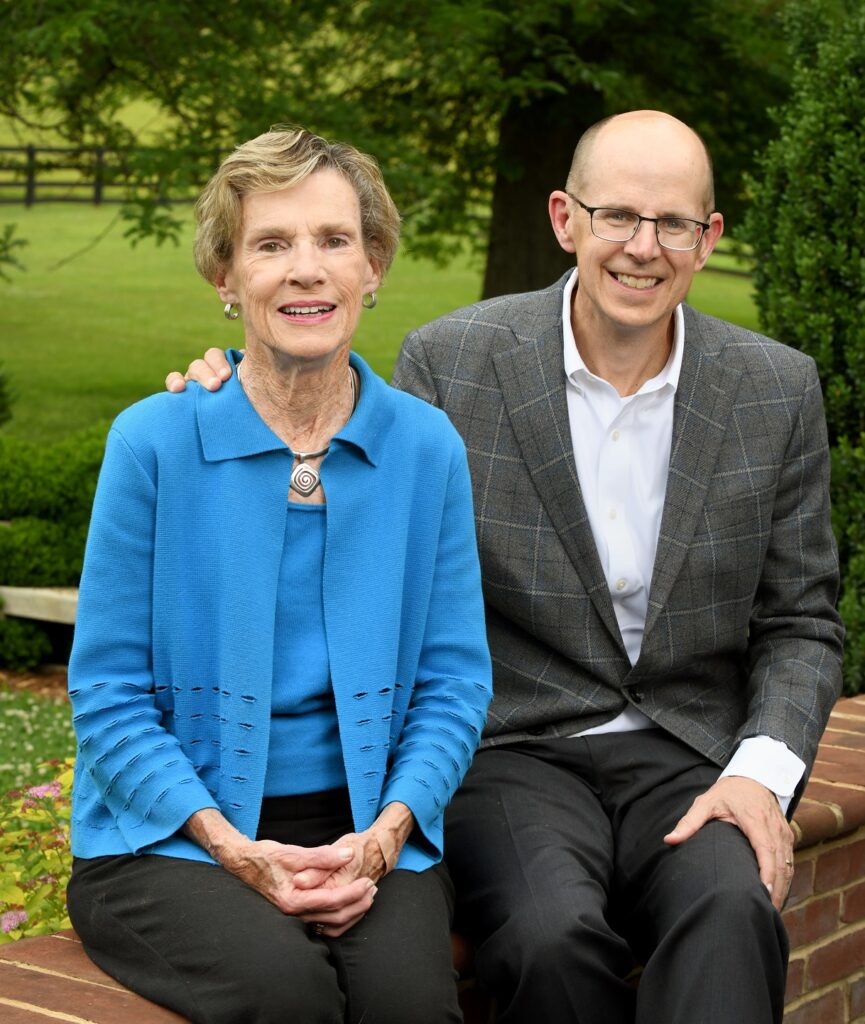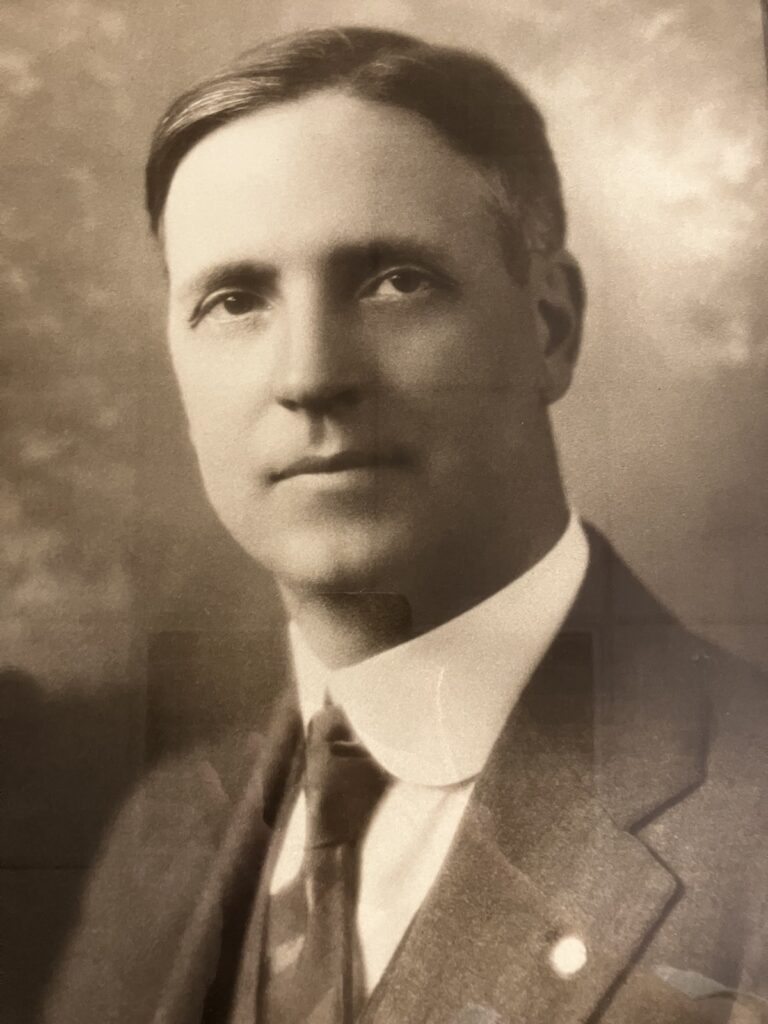The Ellett family has a long history of service — to the Commonwealth, the Roanoke Valley and, with generational impact, the Virginia Western community. Lucy and her son, Russ, were kind enough to sit down on the patio overlooking their beautiful Deyerle farmland and reflect on this legacy with Amanda Mansfield, the Educational Foundation’s Philanthropy Director.

As background, Brown Library is named for Lucy’s grandfather and Russ’ great-grandfather, Col. J. Sinclair Brown, who was Speaker of the Virginia House of Delegates (1930-36) and a stalwart advocate for education and fiscal growth. Lucy’s father, William S. Russell, was the first Chair of Virginia Western’s inaugural Local Advisory Board (1966-71).
Today, Russ, President of Excel Truck Group, serves as the current Vice Chair of the Educational Foundation’s Board of Directors. Lucy is well-known for her indefatigable service to many nonprofits in our region. Conservation is her special passion and her volunteer leadership with the Greenway project is close to her heart.
Amanda: Would you mind sharing your thoughts on the value of higher education in general, based on the fact it has been such a priority in your family’s history?
Lucy: Education has always been very important. Even back before my dad was born, my great-grandparents strongly believed in education. My father’s mother, Mary Byrd Scott (Russell), graduated from Hollins in 1895. I often think about how she and her sister traveled by train with their trunks in tow from Fredericksburg to Roanoke. It’s not like they had a big SUV to fill up, the way you do now. It was a much harder trip in those days. I have a copy of the bill for one of her years at college. I think for the two sisters, it was $395 for the year.
Even though their family was middle class and not at all wealthy, it was important to them to spend their money on education. I’ve always admired that, especially because women were not always sent to college in those days. I think that says a lot for the family’s view on education.
Amanda: How has Virginia Western touched your lives and how do you think Virginia Western touches the lives of people in our community?
Lucy: I took a course at Virginia Western many years ago and I remember it being very good. I know the college has a good reputation today, and it is also very accessible. When someone tells me their child is going to Virginia Western, they say it with pride, and they know the student is getting a good education. That’s my view of Virginia Western in our community, don’t you agree, Russ?
Russ: I do. And more and more of the coursework Virginia Western is developing through partnerships with local businesses is designed specifically to support the jobs we need here in our region.
Lucy: Yes, I’ve admired that, too.
Russ: It’s great for the students because they come out with a degree they can use to make a better life for themselves. And it’s great for the valley because businesses and organizations can fill jobs that are needed for the valley to prosper. It’s really a double win.
Lucy: Well, I think community college meets a lot of needs. If you can’t afford to go to a four-year college right away, you can get your start and then transfer. And even in high school you can begin with dual enrollment courses. This is a difficult time for colleges, too. Some are experiencing a decrease in enrollment while expenses are increasing. Students question the need to spend a lot of money to go off to school. But Bobby (President Sandel) has a lot of great things to offer. I think Virginia Western is well-positioned to answer a lot of the needs in our community.
Russ: It’s about making higher education relevant, about having the relevant courses to ensure you’ve got marketable skills when you get out.
Amanda: When you think about Virginia Western as a philanthropic investment opportunity, what would you hope to see that kind of investment bring back to the community?

Russ: Well, the reason I support both Virginia Western’s Community College Access Program and the Virginia Western Forward Fund (unrestricted permanent endowment) is because it helps students who may not have had the opportunities I had growing up. The education my parents gave me changed my life. Not to say I necessarily appreciated it at the time. (Lucy and Russ smile at one another.) I feel it is important to help students gain life-changing skills so they can provide for their families and build a good life. And again, it’s a win for the community because most Virginia Western students stay here and fill the jobs we need for the future — the healthcare jobs, the tech jobs, for example.
If you care about the Roanoke Valley and you care about people, supporting Virginia Western makes sense. Virginia Western impacts our community by making a recognizable difference in the lives of the people who live here.
Amanda: Who would you say have been mentors for you, provided you the guidance and the support that you feel really helped you belong and brought you both to where you sit today?
Lucy: It’s funny, Russ and I were just talking about this. My dad was very bright and very mischievous, but not at all mean — you know, just young. When he went to college at Virginia Tech, he just wasn’t quite ready. His Roanoke friends all called him “Radio Russell” because during his first year there, he took the iron springs off other pupils’ beds and then carried them up on the top of the dormitory to make radio connections.
Amanda: That is a great story.
Lucy: Well, but it wasn’t so great that he failed his classes. So, he had to make his own way. He went to Florida and worked on — I won’t say a chain gang, but it was sort of like that for two years. He came back to Roanoke and his older brother took pity on him and helped get him back into Virginia Tech. And there was this professor there who changed his life. He was in the Engineering Department and took him under his wing. My dad never made even one B the rest of his time there — all A’s because of this man’s interest in him and his recognition of who he could be.
It’s that kind of life-changing guidance, I think, that Virginia Western can provide.
Russ: Well, I had plenty of teachers who kept me on the right track, like my cross-country coach, and also my trigonometry teacher. She worked with me after school, and then connected me with a fellow student as a tutor. Turned me around from an F to an A in trigonometry.
Lucy: I didn’t quite remember that.
Russ: I do! And my dad, Frank, has always been a great mentor from a business perspective. My father always treats everybody respectfully, always. And everybody thinks the world of him, even his competitors, which says volumes. And then (to Lucy), you’ve certainly set a high bar when it comes to giving back to the community. It puts you right up there.
Amanda: If you had a student sitting in front of you, trying to figure out their path and their future, what mentoring advice would you share? Maybe some advice that someone has given you?
Lucy: Ask yourself, what are you interested in? How do you want to spend your time? Inside or outside? What are you good at? And fit that to a career.
Russ: Well, I hate to just say, “Oh, follow your dreams.” I think you need to contribute to society. Find something that you’re passionate about, whether in your job or outside of your job. Make sure you’ve got a marketable, good skill that will help other people and that you can use to make a life for yourself.
(This story was published in the Winter 2024 edition of Impact magazine, a publication of the Virginia Western Community College Educational Foundation.)





